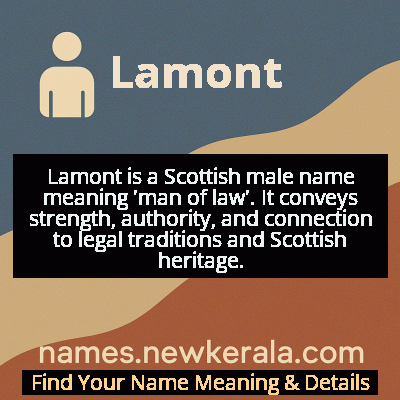Lamont Name Meaning & Details
Origin, Popularity, Numerology Analysis & Name Meaning of Lamont
Discover the origin, meaning, and cultural significance of the name LAMONT. Delve into its historical roots and explore the lasting impact it has had on communities and traditions.
Name
Lamont
Gender
Male
Origin
Scottish
Lucky Number
3
Meaning of the Name - Lamont
Lamont is a Scottish male name meaning 'man of law'. It conveys strength, authority, and connection to legal traditions and Scottish heritage.
Lamont - Complete Numerology Analysis
Your Numerology Number
Based on Pythagorean Numerology System
Ruling Planet
Jupiter
Positive Nature
Optimistic, inspirational, and creative.
Negative Traits
Scattered, exaggerating.
Lucky Colours
Yellow, gold, purple.
Lucky Days
Thursday.
Lucky Stones
Yellow sapphire.
Harmony Numbers
1, 2, 9.
Best Suited Professions
Arts, writing, communication.
What People Like About You
Creativity, optimism.
Famous People Named Lamont
Lamont Cranston
Fictional character
The Shadow, crime-fighting vigilante in pulp fiction and radio
Lamont Dozier
Songwriter, record producer
Motown songwriter responsible for numerous hits with Holland-Dozier-Holland
Lamont Johnson
Film director
Emmy Award-winning director known for television films and social commentary
Lamont Peterson
Professional boxer
Former light welterweight world champion
Name Variations & International Equivalents
Click on blue names to explore their detailed meanings. Gray names with will be available soon.
Cultural & Historical Significance
The name carries the weight of Scottish resilience and legal tradition, embodying both the aristocratic heritage of Scottish clan society and the tragic history of Highland clearances and clan conflicts. In modern times, Lamont represents the global Scottish diaspora, with bearers of the name found throughout the English-speaking world, particularly in North America where many Scottish immigrants settled. The name maintains its connection to Scottish identity while adapting to contemporary multicultural contexts, serving as a living link to Scotland's complex history of Norse settlement, clan warfare, and cultural preservation.
Extended Personality Analysis
Individuals named Lamont are often perceived as possessing strong leadership qualities and a natural sense of justice, reflecting the name's meaning of 'man of law'. They tend to be analytical thinkers with methodical approaches to problem-solving, combining intellectual depth with practical wisdom. Lamonts typically exhibit quiet confidence rather than overt assertiveness, earning respect through competence and reliability rather than forceful personality. There's often a dignified reserve about them, coupled with strong family loyalty and traditional values that harken back to their Scottish clan origins.
Their decision-making tends to be careful and considered, weighing consequences with the deliberation one might expect from someone connected to legal traditions. Many Lamonts display a blend of cultural pride and modern adaptability, maintaining connection to heritage while navigating contemporary life with grace and intelligence. They often excel in professions requiring both analytical thinking and interpersonal skills, such as law, education, management, or counseling. The name suggests someone who values structure and order but understands the human element within systems, creating a balanced personality that combines principle with compassion. This makes Lamonts often sought as mediators and trusted advisors in both personal and professional contexts.
Modern Usage & Popularity
In contemporary usage, Lamont maintains steady but modest popularity, particularly in Scottish-descended communities and African American families where it gained traction during the 20th century. The name saw increased usage following the success of television shows like 'Sanford and Son' in the 1970s, which introduced the name to wider audiences. While never reaching top 100 popularity lists in most English-speaking countries, it maintains a consistent presence, often chosen by parents seeking a strong, traditional name with cultural depth that isn't overly common. Recent years have seen some revival interest as vintage names return to fashion, with Lamont appealing to those wanting Scottish heritage names that work well internationally. The name's professional, substantial sound makes it popular among families valuing education and career achievement, while its distinctive quality ensures it stands out without being overly unusual.
Symbolic & Spiritual Meanings
Symbolically, Lamont represents the bridge between ancient tradition and modern application of justice and order. The name carries connotations of mountain strength and legal authority, embodying both the steadfastness of highland landscapes and the intellectual rigor of legal reasoning. It suggests a person who serves as a moral compass or anchor within their community, someone who upholds principles while remaining adaptable to changing circumstances. The symbolic meaning extends to cultural endurance—representing the survival and adaptation of Scottish identity through centuries of change and challenge. Lamont symbolizes the integration of Norse resilience with Scottish clan loyalty, creating a unique identity that values both individual strength and communal responsibility. The name evokes images of someone who builds rather than destroys, who arbitrates rather than conflicts, and who maintains integrity through life's complexities while honoring the wisdom of ancestral traditions.

